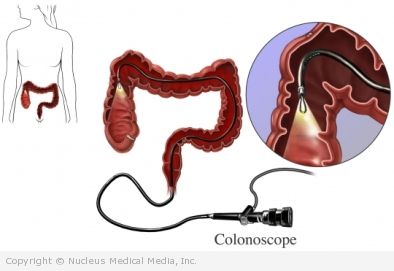Irritable bowel syndrome
(Functional Colitis; IBS; Intestinal Neurosis; Irritable Colon; Laxative Colitis; Mucous Colitis; Nervous Indigestion; Spastic Colon)
Irritable bowel syndrome – Definition
Irritable bowel syndrome (IBS) is a chronic disorder of the intestines. IBS does not cause inflammation and does not lead to a more serious condition.
Irritable bowel syndrome – Causes
The cause is unknown. With IBS, the muscles in the colon do not work normally and may spasm. If you have IBS, your colon may be more sensitive, reacting strongly to food and medication. Food allergies and certain bacteria may add to the symptoms. IBS may also occur after having the stomach flu (called gastroenteritis).
Irritable bowel syndrome – Risk Factors
These factors increase your chance of developing IBS:
- Sex: female
- Family members with IBS
- Age: typically begins in young adulthood
- Stress
- Generalized anxiety disorder (associated with IBS)
- Abuse (may be associated with IBS)
Tell your doctor if you have any of these risk factors.
Irritable bowel syndrome – Symptoms
Symptoms usually come and go and range from mild to severe. They include:
- Abdominal cramps
- Gas and bloating
- Pain that resolves with a bowel movement
- Loose stools
- Diarrhea
- Constipation
- Alternating diarrhea and constipation
- Urge to move bowels again immediately following a bowel movement
- Mucus in the stool
These factors may worsen your symptoms:
- Stress
- Menstrual periods
- Large meals or fatty foods
- Excess gas
Irritable bowel syndrome – Diagnosis
The doctor will ask about your symptoms and medical history, and perform a physical exam. In many cases, a diagnosis can be made based on this. Since there is no diagnostic test for IBS, doctors have created criteria for making a diagnosis.
Your doctor may order the following tests to rule out other conditions:
- Analysis of a stool sample to check for blood or evidence of inflammation
- Blood tests
- Barium enema — injection of fluid into the rectum to make the colon show up on an an x-ray, allows the doctor to see abnormal spots in the colon
- Flexible sigmoidoscopy — a thin, lighted tube inserted into the rectum to examine the rectum and the lower colon
- Colonoscopy — a thin, lighted tube inserted through the rectum and into the colon to examine the lining of the entire colon
Your doctor may also screen you for celiac disease, which is more common in people with IBS.
Irritable bowel syndrome – Treatment
There is no cure for IBS. Treatment focuses on controlling symptoms.
Diet
The following changes to your diet may help control symptoms:
- Keep a food diary of what you eat and how your body responds. Share this with your doctor. You may have a food allergy.
- Make gradual changes to your diet. Record the results.
- Avoid foods that have caused problems in the past. A dietitian can help you substitute foods.
- Avoid foods and drinks that may cause symptoms:
- High fat foods, spicy foods
- Dairy products
- Onions, cabbage, and other gas-producing food
- Large amounts of alcohol or caffeine
- Eat foods that may reduce the chance of spasm, such as:
- Fruits and vegetables
- Whole grains and other high-fiber foods (More fiber may increase gas and bloating until your body adjusts.)
- Eat smaller meals more often or smaller portions.
- Eat slowly and try not to swallow air.
- Drink plenty of water. This will help to reduce constipation.
Exercise
Participating in a regular exercise program can help improve bowel function and other IBS symptoms. If you would like to start exercising, check with your doctor to make sure you are healthy enough.
Stress Management
Talk to your doctor about ways to reduce stress, such as:
- Relaxation
- Biofeedback
- Counseling
Education
Learn as much as you can about IBS and ways that you can reduce your symptoms. You may also find it helpful to join a support group.
Medication
Depending on your symptoms, your doctor may recommend:
- Antispasmodic agent (eg, dicyclomine, alverine citrate)
- Antibiotics (eg, rifaximin [Xifaxan])
- High-fiber bulking agent (eg, psyllium)
- Antiflatulant (eg, simethicone)
- Antidiarrheal agent (eg, loperamide)
- Low-dose antidepressant
- Pain reliever (eg, acetaminophen) — may help with crampy abdominal pain
- Serotonin receptor agonists and antagonists (also called 5-HT3 antagonists) — may be helpful for treating diarrhea, as well as treating other IBS symptoms, like abdominal pain in women (eg, alosetron)
- Probiotics (“friendly” bacteria) — may be helpful, but talk to your doctor before taking
- Peppermint oil
In some cases, your doctor may recommend that you take a combination of medicines.
Irritable bowel syndrome – Prevention
There are no guidelines for preventing IBS because the cause is unknown.

